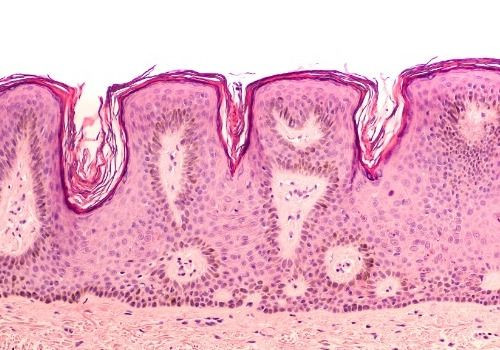Dermatology SCE – a closer look
- March 28, 2022

The Dermatology SCE is the higher postgraduate qualification provided by the Royal College of Physicians as a specialist qualification for dermatologists. It is one of 11 SCEs offered by the College and offers physicians a higher postgraduate qualification than MRCP which can be used to demonstrate to prospective employers the achievement of a standard equivalent to UK specialist doctors.
Here we take a closer look at the MRCP (UK) Dermatology Specialty Certificate Examination for doctors who have chosen to specialise in dermatology. We cover the content of the exam, as well as fees and the eligibility criteria, which we’ve summarised below with a broad look at the following topics:
- What is the SCE in Dermatology?
- Where does the SCE fit into my training?
- What is the structure of the Dermatology SCE?
- How do I apply for the exams and what do they cost?
- Where can I sit the exams as an overseas dermatologist?
- How should I prepare for the exams as an IMG?
- I’ve passed? What’s next?
Skip ahead to the relevant section if you know what you're looking for.
MRCP (UK) SCE in Dermatology
The dermatology specialty certificate exam is administered as a compulsory element of assessment towards the Certificate of Completion of Training (CCT) in dermatology for all UK trainees.
The purpose of an SCE is to:
- ensure that certified specialists have sufficient knowledge of their specialty to practice safely and competently as consultants
- complement workplace-based assessments
- provide a rigorous national assessment to establish public confidence
- offer a challenge similar to sub-specialty certification examinations in North America
The SCE as Part of Training in Dermatology
Since the MRCP(UK) exams are taken during the Internal Medicine Training years (ST1-ST3), the dermatology SCE allows physicians to demonstrate that they are able to practice independently at a consultant level.
The SCE has no fixed entry requirements (both for UK and overseas candidates); however, UK trainees would normally sit the SCE in their penultimate year of higher specialty training (ST6). UK trainees should have made at least one attempt at the dermatology SCE by the time of their penultimate year assessment.

For an in-depth guide to the MRCP exams, see our IMG Resources library here.
Exam Structure
The SCE comprises 200 questions which assesses candidates on a wide range of common and important disorders, as set out in the syllabus of the curriculum. This should be taken as an indication of the likely number of questions for each section – the actual number may vary:
|
Topic |
Number of questions |
|
Cutaneous allergy |
10 |
|
Dermatopathology |
10 |
|
Dressings & wound care |
10 |
|
Formulation & systemic therapy |
10 |
|
General dermatology & dermatology in primary health care |
50 |
|
Genito-urinary disorders and oral medicine |
10 |
|
Infectious disease |
10 |
|
Paediatrics & genetics |
30 |
|
Photodermatology |
10 |
|
Psychodermatology |
5 |
|
Skin biology & research |
15 |
|
Skin oncology |
20 |
|
Skin surgery and cosmetic dermatology |
10 |
|
200 |
There are two three-hour papers, with the questions in each category distributed across both papers.
All SCEs are computer-based and are administered by Pearson VUE at a test centre in the UK or internationally.
Dermatology SCE Applications
The SCEs are held once a year and all applications are made online through the My MRCP(UK) account, found in the Upcoming Exams section of the Royal College website.
The application process is as follows:
- Register online through My MRCP(UK) (candidates have the opportunity at this point to register any special arrangements)
- Request a preferred test country and city
- Pay applicable examination fee
- Application is confirmed via an automatically generated email
- Receive test centre confirmation email from Pearson VUE within four weeks of the examination date.
The Royal College of Physicians has created a helpful video guide on SCE applications which you can watch here.
Cost
The cost of the SCE exams are as follows:
- UK centres: £665
- International centres: £833
Exam Centres
UK Centres
Candidates who choose to sit the dermatology SCE in the UK must contact Pearson VUE to book their test. There are around 137 test centres throughout the UK for each SCE, and the Royal College of Physicians advise that candidates should book their exam as early as possible to secure their preferred test centre, since bookings operate on a first come first served basis.
International Centres
Candidates are given a choice of regions and are then asked to nominate a particular city in that region as their desired test location. The Royal College of Physicians passes this request to Pearson VUE once the application period has closed, and Pearson VUE will confirm final test centre details to candidates via email at least three weeks before the examination date. If the exam is not available in the requested location, candidates will be offered a choice of the nearest available test centres.
Please note, international candidates should not book their own test directly with Pearson VUE - attempting to do so may delay a candidate's application.
The full list of international test centres for the SCE can be found here.
Preparation and Resources for the Dermatology SCE
It can be difficult for IMGs to know where to start with their preparation and revision, particularly as the exam requires a wide breadth of knowledge around the curriculum and should involve reading textbooks, journals and guidelines.
This list should provide a good starting point for any international dermatologists preparing to sit the SCE:
Curriculum - Applicants are tested on a range of common and important disorders in Dermatology as set out in the Joint Royal Colleges of Physicians Training Board’s Specialty Training Curriculum for Dermatology. We recommend getting to know the curriculum as early as possible and using it as a blueprint for your study.
Below are some other good reading materials and sources:
Textbooks
- Rook's Textbook of Dermatology - Eds DA Burns, SM Breathnach, N Cox, CE Griffiths
- Textbook of Pediatric Dermatology - Eds AD Irvine, PH Hoeger, AC Yan
- Dermatology - Eds JL Bolognia, JL Jorizzo, RP Rapini
- McKee’s Pathology of the Skin - JE Calonje, T Brenn, A Lazar, P McKee
Journals
- British Journal of Dermatology (BJD)
- Clinical and Experimental Dermatology (CED)
- Journal of the American Academy of Dermatology (JAAD)
- Journal of Investigative Dermatology
- The Journal of the American Medical Association (JAMA)
Websites
- British Association of Dermatologists (BAD)
- British Society for Investigative Dermatology (BSID)
- British Society for Cutaneous Allergy
- British Society for Medical Dermatology
- British Society for Dermatological Surgery (BSDS)
- DermIS (dermatology image resource)
- eMedicine online reference
- DermNet NZ (New Zealand dermatology society)
- Dermatology e-learning resource
Sample questions: It is a good idea to regularly assess your knowledge and progress using example questions from the current exam syllabus. You can find these here.
For an overview of how to prepare for exams, including advice on study groups, online community support, the best use of online resources & Royal College materials and courses, check out at our blog: IMG Connects Top Tips for exam preparation.
I’ve passed? What’s next?
Congratulations – what an achievement! With your higher postgraduate qualification, you will be able to apply for NHS roles above ST3 which are likely more suited to your seniority and experience – nice one.
Don’t hesitate to get in touch with an IMG medicine recruitment specialist to discuss GMC registration, dermatology positions in the NHS, salaries, suitable UK locations and hospitals for you, and relocation.
To receive the latest news and updates, including the Royal Colleges, GMC registration and the NHS, follow us on social media and join the conversation.



